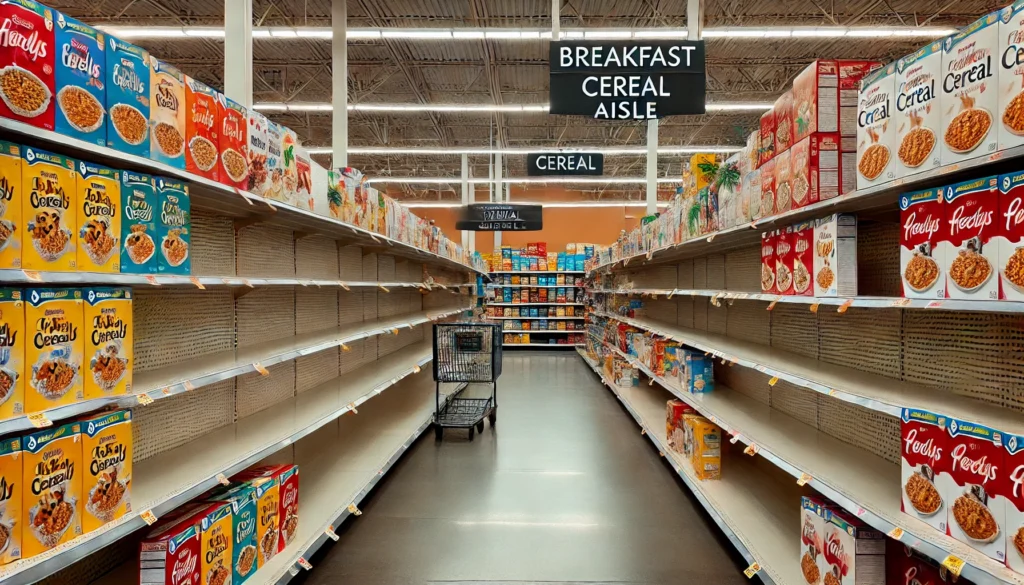
Farm Faulters A supermarket breakfast cereal aisle with nearly empty shelves. The scene shows a few scattered cereal boxes left on the shelves but most of the shel.webp.webp
Midwest City, MO — It was a quiet morning on the Johnson family farm, where the cows mooed contentedly and the crops swayed gently in the breeze. But beneath this pastoral calm, a series of bizarre events was about to unfold, threatening the very existence of America’s most beloved breakfast cereals. What began as an ordinary day quickly turned into chaos, as the farm became ground zero for a cereal catastrophe that would send shockwaves through breakfast tables nationwide.
Trouble began when the farm’s chickens, normally the picture of barnyard tranquility, suddenly went berserk after accidentally consuming a spilled batch of cocoa powder. Witnesses reported that the chickens, seemingly possessed, began dive-bombing the farm’s chocolate silo as if they were vampire bats on a mission.
Dr. Henrietta Peck, a leading expert in avian behavior, remarked on the strangeness of the situation, noting that chickens can indeed exhibit abnormal behaviors when exposed to unusual substances. “This is an unprecedented case,” she said, “but not entirely implausible given the circumstances.”
Martha Johnson, the farm’s matriarch, watched in horror as her precious chocolate supply dwindled. “Those hens were crazier than a bag of bats,” she recalled. “They ripped through that chocolate like it was their last meal.”
As word of the incident spread, breakfast enthusiasts across the country voiced their concerns. “I’m not sure I can trust Count Chocula anymore,” said one concerned consumer, reflecting a growing public unease about the future of the beloved cereal.
Froot Loops’ Pigpen Plunge
The chaos continued when the farm’s pigs discovered a stash of vibrant fruit essences destined for Froot Loops. After wallowing in the colorful liquid, the pigs emerged looking like life-sized versions of the cereal, much to the amusement—and confusion—of the farm’s workers.
“It was like walking into a cartoon,” said Henry, a longtime farmhand. “These pigs were all rainbow-colored and smelled like a candy store.”
Dr. Samuel O’Brien, an agricultural chemist familiar with the incident, explained that fruit essences are potent and can adhere to almost any surface, including pigskin. “What happened here is a perfect storm of agricultural mishap and nature’s unpredictability,” he commented, adding that the pigs’ new appearance could confuse consumers expecting their Froot Loops to remain pig-free.
Surveys showed a mixed reaction from the public, with some amused by the idea of fruity-flavored bacon, while others were disturbed by the thought of their favorite cereal being contaminated by pig-related incidents.

Cap’n Crunch’s Corn Conundrum
Meanwhile, the farm’s cornfields—critical for producing Cap’n Crunch—suffered a catastrophic blow when a freak hailstorm flattened the crops. The resulting harvest was less ‘crunch’ and more ‘mush,’ sending shockwaves through the Cap’n Crunch supply chain.
A witness to the aftermath, John Miller, a local farmer, noted, “We’ve had hailstorms before, but nothing like this. The corn looked like it had been through a blender.”
The Cap’n himself wasn’t pleased, with reports surfacing that shipments of Cap’n Crunch began arriving at stores with a consistency more akin to soggy oatmeal than the famously crunchy cereal. Longtime fans were dismayed. “Cap’n Crunch was always about that bite,” lamented one loyal customer. “Now it’s like eating wet cardboard.”
Industry analysts warned that the loss of the Cap’n’s signature crunch could spell trouble for the brand, which has long been a staple of breakfast tables across the nation.
Cocoa Puffs’ Cattle Calamity
The situation grew even more surreal when the farm’s cows, always curious, broke into the storage barn containing Cocoa Puffs. After feasting on the cocoa-laden cereal, the cows became unusually energetic, producing chocolate-flavored milk that soon flooded the market.
“At first, we thought it was a miracle,” said Tom Johnson, who initially welcomed the novelty. “But then we realized the milk tasted… off. It wasn’t quite the chocolate milk you’d expect.”
While some consumers were thrilled by the idea of naturally chocolate-flavored milk, others were less enthused. “It’s weird,” one shopper confessed. “I like my milk and my cereal separate, thank you very much.”
Cocoa Puffs faced a sudden decline in sales as customers struggled to reconcile their love for the cereal with the unexpected consequences of the cows’ cocoa binge.
Lucky Charms’ Leprechaun Letdown
The farm’s troubles reached a new height of absurdity when the sheep, attracted by the bright colors of Lucky Charms’ marshmallows, devoured the entire stockpile. In a strange twist, the sheep began growing rainbow-colored wool, transforming the farm into a psychedelic spectacle.
“I didn’t know whether to shear them or take them to a fashion show,” said Martha Johnson, barely suppressing her laughter.
But the humor quickly faded as shipments of Lucky Charms started arriving with fewer marshmallows than expected. “The marshmallows are what make Lucky Charms, well, lucky,” explained a frustrated fan. “Without them, it’s just oats and disappointment.”
The leprechaun, normally full of cheer, was reportedly inconsolable as his magically delicious cereal became more mundane by the day.

Honeycomb’s Bee-tastrophe
Even Honeycomb wasn’t safe from the farm’s madness. When the bees responsible for the cereal’s honey supply learned that their hard work was being used to create oversized cereal pieces rather than enjoyed in its pure form, they went on strike.
“It was chaos,” reported a farmhand who witnessed the bee uprising. “The bees swarmed the honey silo, refusing to let us near it. They were determined to keep their honey for themselves.”
With the bees no longer cooperating, Honeycomb cereal production slowed to a crawl. “No honey, no Honeycomb,” said Dr. Alicia Beecher, an expert in apiculture. “It’s as simple as that.”
Shoppers began to notice the scarcity, with many expressing their dismay at the dwindling supply of their favorite cereal. “I never thought I’d miss bees this much,” one shopper quipped, reflecting the growing sentiment of cereal lovers everywhere.
Cookie Crisp’s Coyote Chaos
The saga took another wild turn when the farm’s coyotes, attracted by the scent of Cookie Crisp, began nightly raids on the cereal supply. The Johnsons tried everything to fend them off, but the coyotes were too clever, leaving the farm’s stores of Cookie Crisp in tatters.
“The coyotes were relentless,” recalled one of the farm’s night watchmen. “They came in packs, and there was no stopping them.”
With Cookie Crisp shipments heavily compromised, consumers began receiving boxes with more bite marks than actual cereal. “It’s like the cereal went through a blender,” one disgruntled customer complained.
Despite the efforts of wildlife experts to curb the coyote problem, Cookie Crisp faced an uphill battle to restore its reputation, with fans increasingly wary of finding more than just cookies in their breakfast bowl.

Fruity Pebbles’ Fossil Fiasco
In a bizarre twist, the Johnsons discovered what they initially believed to be ancient dinosaur bones while digging in one of their fields. Upon closer inspection, however, these “fossils” turned out to be giant Fruity Pebbles, petrified by years of exposure to the elements.
“It was the darndest thing,” said Joe Johnson. “We thought we were about to make a historical discovery, but all we found were these rock-hard Fruity Pebbles.”
The cereal, usually known for its crunch, was now a tooth-breaking hazard. “I nearly chipped a tooth on one of these,” complained a customer who had the misfortune of trying the new “petrified” version.
Sales of Fruity Pebbles plummeted as consumers turned to softer, less geologically-inclined options for their morning meals.
Reese’s Puffs’ Peanut Butter Pandemonium
Reese’s Puffs encountered a flavor disaster when the farm’s peanut butter silo was infiltrated by a group of hungry squirrels. The critters chewed through the supply, leaving behind nothing but acorn butter—a far less appealing substitute.
“We knew something was wrong when the cereal started tasting like the forest floor,” admitted Tom Johnson. “The squirrels had wiped us out.”
Consumers quickly noticed the change, with many voicing their displeasure online. “This isn’t Reese’s Puffs,” wrote one disappointed fan. “It’s squirrel food in disguise.”
The brand’s reputation took a hit as Reese’s Puffs struggled to regain the trust of their peanut butter-loving customer base.
Waffle Crisp’s Syrup Situation
Waffle Crisp faced a sticky problem when the farm’s maple trees, crucial for creating the cereal’s signature syrup flavor, were accidentally tapped for motor oil instead. The mix-up wasn’t discovered until the syrup was already on its way to the production line.
“I couldn’t believe it,” said Jim, the farm’s mechanic, who was the first to realize the error. “The smell alone should have been a giveaway.”
Shoppers were horrified when they opened their boxes of Waffle Crisp only to be greeted by a strong gasoline odor. “I thought my breakfast was about to explode,” joked one consumer.
The blunder led to a nationwide recall, with Waffle Crisp fans left wondering how such a mistake could have happened in the first place.
Apple Jacks’ Orchard Overload
Apple Jacks faced a fruity crisis when the farm’s apple trees, cross-pollinated with the Froot Loops pigs’ fruit essences, began producing apples the size of watermelons. While visually impressive, these oversized fruits were nearly impossible to process, leading to a cereal that was more apple than jack.
“It was like trying to make cereal out of bowling balls,” said Martha Johnson. “We had to get creative, but in the end, it just wasn’t feasible.”
Boxes of Apple Jacks started showing up with whole apple slices inside, leading to confusion and frustration among consumers. “I didn’t sign up for apple chips in my cereal,” one shopper lamented.
As the apple crisis worsened, Apple Jacks began losing its appeal, with fans turning to more traditional, less fruit-laden options.
Trix’s Rabbit Ruckus
The Trix rabbit found himself in hot water when the Johnson farm’s real rabbits, tired of his cereal-stealing antics, launched a full-scale rebellion. They raided the Trix storage facility, hoarding the cereal for themselves and leaving nothing but empty boxes behind.
“It was like a scene out of a cartoon,” said one farmhand. “Rabbits everywhere, and not a single Trix to be found.”
Consumers quickly caught on, with many wondering why their Trix boxes were arriving suspiciously light. “I feel like I’ve been tricked,” complained one customer, echoing the sentiments of many.
As the rabbit uprising continued, Trix sales took a nosedive, with breakfast lovers turning to more reliable cereal options.
Golden Grahams’ Molasses Mishap
Golden Grahams faced a sticky situation when the Johnson farm’s molasses barrel tipped over into the cereal production line. The result? Golden Grahams that were more like Golden Glue.
“It was like trying to eat a sticky note,” said one unfortunate tester. “The cereal was so sticky it wouldn’t even come out of the box properly.”
Consumers were equally unimpressed, with many returning their boxes after finding the cereal nearly impossible to eat. “This is not the Golden Grahams I know and love,” one customer wrote in an online review.
The molasses mishap left Golden Grahams struggling to regain its footing in the competitive breakfast cereal market.
Cinnamon Toast Crunch’s Cinnamon Shortage
Cinnamon Toast Crunch suffered a flavor crisis when the farm’s only cinnamon tree was accidentally chopped down to make room for more Honeycomb. Without its signature spice, the cereal was left tasting bland and uninspired.
“It was just toast crunch,” sighed one disappointed consumer. “No cinnamon, no fun.”
Reports from the farm indicated that the Cinnamon Toast Crunch mascot, usually full of energy, was seen moping around the fields, unable to muster the enthusiasm to crunch anything.
As cinnamon supplies dwindled, the cereal’s popularity plummeted, with fans turning to other, more flavorful options.
French Toast Crunch’s Poultry Problem
French Toast Crunch faced an unexpected enemy when the farm’s geese, drawn by the cereal’s maple flavor, began terrorizing the farm in search of more. The geese pecked their way through the cereal supply, leaving nothing but crumbs in their wake.
“I’ve never seen geese so determined,” said Martha Johnson. “They were relentless.”
The aftermath was disastrous for French Toast Crunch, as consumers began receiving boxes filled with little more than goose-gnawed remnants. “I wanted French toast, not a goose attack,” one customer quipped.
The cereal’s reputation took a hit as breakfast lovers questioned how a cereal could be so delicious it caused an avian invasion.
When the Farm Falters…
The Johnson family farm, once a peaceful haven of agricultural harmony, became a battleground where breakfast favorites fought for survival. From rebellious rabbits to syrup-addicted geese, the farm’s mishaps have forever changed the cereal landscape. As the Johnsons struggle to recover, consumers are left pondering what new and bizarre flavors might emerge from the chaos. One thing’s for sure—breakfast will never be the same again.
Observations About Farmageddon and Cereal Catastrophes
- Chickens Gone Cuckoo – Who knew a little cocoa could turn your farm’s chickens into chocolate-loving dive-bombers? Maybe they just wanted a change from pecking at corn.
- Pigs in Paradise – The pigs rolling in fruit essence and turning into walking Froot Loops might be the most colorful rebellion in farm history. Somewhere, a rainbow just cried tears of joy.
- The Crunch that Couldn’t – When your corn is pre-crunched by a hailstorm, Cap’n Crunch becomes more like Cap’n Soggy. It’s like the cereal lost its sea legs.
- Chocolate Cow Conundrum – Cows producing chocolate milk after munching on Cocoa Puffs? Finally, a reason to consider them as your next Easter Bunny replacement.
- Psychedelic Sheep – Sheep with rainbow-colored wool after eating Lucky Charms? Fashion week just got a new headliner, but your breakfast got a little less magical.
- Bee Union Strike – Honeycomb cereal halted because the bees decided they’d rather keep their honey? This is what happens when bees realize their buzz has real bargaining power.
- Coyote Cookies – Cookie Crisp facing nightly coyote raids? When even the wildlife gets a taste for cookies, you know your cereal is irresistible.
- Pebble Problems – When your Fruity Pebbles are mistaken for ancient fossils, breakfast turns into an archaeological dig. Someone get Indiana Jones on the line.
- Squirrelly Snafu – Squirrels replacing peanut butter with acorn butter in Reese’s Puffs might be their way of saying, “Nuts to you!”
- Motor Oil Mistake – Accidentally tapping maple trees for motor oil in Waffle Crisp production is proof that even breakfast can have a mid-life crisis.
- Giant Apples, Tiny Jacks – When your apple trees start producing watermelons, Apple Jacks turns into Apple Jumbos. How do you like them apples?
- Rabbit Revolt – Trix’s mascot outsmarted by real rabbits? The cereal that was for kids now belongs to the bunnies. Talk about a breakfast coup.
- Gooey Golden Grahams – When Golden Grahams become Golden Glue, it’s the ultimate sticky situation. Who knew cereal could double as a school project?
- Cinnamonless Toast Crunch – Cinnamon Toast Crunch without the cinnamon is like toast without butter. Just… why?
- Goose Gone Wild – Geese taking over French Toast Crunch for its maple flavor? Suddenly, your breakfast has become an episode of “When Animals Attack.”
Disclaimer: This article was the result of a purely human collaboration between a cowboy and a farmer who may have spent a little too much time in the cereal aisle. Any resemblance to real farm disasters is purely coincidental, though we wouldn’t be surprised if something similar happens in the future.
Originally Published at FarmerCowboy.com
2024-08-29 08:40:26
Karl Hoffman is a distinguished agriculturalist with over four decades of experience in sustainable farming practices. He holds a Ph.D. in Agronomy from Cornell University and has made significant contributions as a professor at Iowa State University. Hoffman’s groundbreaking research on integrated pest management and soil health has revolutionized modern agriculture. As a respected farm journalist, his column “Field Notes with Karl Hoffman” and his blog “The Modern Farmer” provide insightful, practical advice to a global audience. Hoffman’s work with the USDA and the United Nations FAO has enhanced food security worldwide. His awards include the USDA’s Distinguished Service Award and the World Food Prize, reflecting his profound impact on agriculture and sustainability.
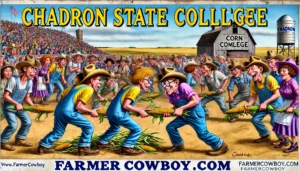
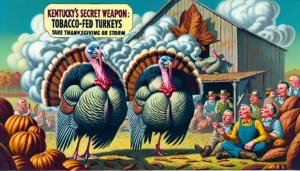

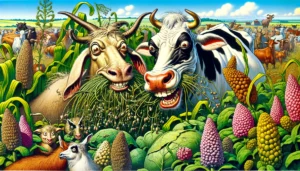
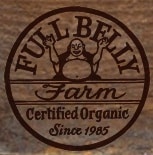
Country music on Farm Radio brings a sense of nostalgia to my farming routine.